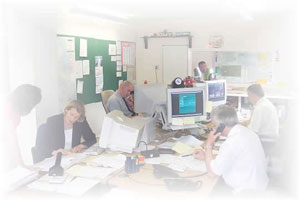Freight Forwarder
Tasks & duties

Freight forwarders may do some or all of the following:
-
find the most appropriate and cost-effective way of moving goods
-
prepare goods for dispatch
-
communicate with carriers such as road, rail, air and sea companies
-
book transport cargo space and prepare quotations and invoices
-
confirm transport arrangements
-
complete export documentation such as Bills of Lading
-
liaise with international freight forwarders to arrange pick up and delivery of goods
-
advise clients of the costs of transporting goods and of the arrangements that have been made
-
record movement and placement of goods while they are in transit
-
check incoming goods against documents
-
keep records of goods dispatched and received
-
clear goods through customs
-
arrange insurance for goods, and the payment of duties and taxes
-
organise the delivery of goods for export or to an importer's premises
Skills & knowledge
Freight forwarders need to have:

-
knowledge of international laws and standards regarding the transport of goods such as those set down by the International Air Transport Association (IATA)
-
knowledge of shipping terms and United Nations port codes
-
knowledge of carriage of goods laws, including dangerous goods regulations
-
knowledge of transport systems
-
knowledge of methods of packing and stowing goods
-
excellent people and customer service skills
-
good oral and written communication skills
-
record-keeping skills
-
problem-solving skills
-
numeracy skills
-
basic computer skills
-
fork-lift operating skills
Knowledge of a foreign language may also be useful.
Entry Requirements
There are no specific entry requirements to become a freight forwarder. However, a current driver's licence with a good driving record and no criminal convictions is preferred by employers.
Secondary Education
There are no specific educational requirements for this job. However, School Certificate or NCEA equivalent English and maths is preferred, as spelling and the ability to make calculations are an important part of the job.
Tertiary Education
A tertiary qualification in customs broking, freight forwarding and logistics, such as the Diploma in Shipping and Freight offered at Manukau Institute of Technology, may be an advantage.
Training on the job
Skills such as dangerous goods handling, cargo stowage, cargo classification and dealing with hazardous substances are learned on the job.
People often work as trainee freight forwarders completing short courses, correspondence courses or part-time courses while they work. For further information contact the Customs Brokers and Freight Forwarders Federation of New Zealand Inc.
Useful Experience
Useful experience for freight forwarders includes:
-
working for a shipping line or importer/exporter
-
work in customs
-
courier work
-
office or accounts work
-
warehouse and stores work
-
grocery or retail work
-
work in sales.
Related courses
International Business
Purchasing, Warehousing and Distribution
For more information, please refer to Career Services.
Document Actions
